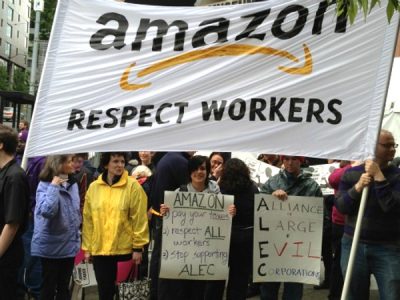The New Senate $480 Economic Stimulus Bill. A “Social Safety Net” for Banks and Billionaires

Republicans and Dems serve privileged interests exclusively on major issues, differing only rhetorically for political reasons.
At a time of economic shutdown with growing millions of Americans out of work, congressional focus is largely on helping monied interests.
It’s unclear how much Payroll Protection Program (PPP) money is going to workers.
On Tuesday, CNBC reported that small businesses getting this funding “are among the lucky few,” adding:
“Business owners must now decide how to spend their money” — to retain workers or use it for other expenses to stay solvent.
“Some (recipient firms) are delaying disbursement(s)” because other priorities take precedence.
Some large companies are getting funds earmarked for small ones.
An estimated three-fourths of small businesses applied to the Small Business Administration for forgivable loans.
About 80% of applications haven’t been processed. Most small businesses needing financial help haven’t gotten it.
It’s unclear how many will be helped while economic hard times continue, countless numbers likely to be left out entirely.
Many won’t survive because of economic shutdown, jobs for their workers to be permanently gone.
Complicating things further is that millions of unemployed US workers aren’t getting their unemployment checks.
Weeks after applying for benefits, they remain in limbo. One frustrated unemployed worker said she may be homeless before help arrives.
About 22 million Americans applied for benefits, applications for millions more remaining to be processed, many others likely to apply as layoffs and furloughs continue.
One economist called the backlog a “peak load problem. The system is overloaded” and can’t keep up with the huge volume.
In Ohio, processing claims for eligible workers was delayed until mid-May.
In hindsight when current economic shutdown and COVD-19 outbreaks end, evidence may show the death toll to be higher from untreated commonplace major illnesses, deprivation, and despair than from the novel coronavirus.
Yet little or nothing is reported about an issue too important to ignore, what’s unaddressed by Congress and the White House.
There’s no federal funding to treat the sick, house the homeless, or feed the hungry.
Yet major banks and other corporate favorites got trillions of dollars in free money — an unprecedented wealth transfer scheme from ordinary people to privileged ones.
On Tuesday, Public Citizen president Robert Weissman slammed the Trump regime for using COVID-19 outbreaks “as a pretext to launch a sweeping effort to repeal or suspend regulatory safeguards,” adding:
At a time when protecting public health and welfare should be prioritized, Trump is “exploit(ing)” current conditions “to let corporations pollute our air and water, rip off consumers, endanger workers, and trample on civil rights…”
He’s “leav(ing) the nation economically weaker and will worsen public health.”
His agenda is doing little “to get money back into the pockets of consumers, workers and small business owners, or to put people back to work.”
On Tuesday, the Senate passed a $480 billion economic stimulus measure that left vital needs unaddressed, House adoption likely coming on Thursday.
The funding bill includes nothing for states and cities, nothing to feed hungry Americans, nothing to assure the unemployed get benefits quickly while economic crisis conditions continue, nothing to freeze rent and mortgage payments for unemployed workers, nothing for the beleaguered US Postal Service, and no hazard pay for front-line workers.
The measure includes $320 billion to small businesses for PPP —that may be used for other priorities with some of the funding likely going to larger firms, some earmarked for banks and credit unions.
Around $60 billion in loans and grants is earmarked for Economic Injury Disaster Loan disbursements — agribusiness eligible to receive them, likely to get the lion’s share.
There’s $75 billion for hospitals and $25 billion for virus testing.
Center on Budget and Policy Priorities president Robert Greenstein called the Senate bill “inadequate” for failing “to deliver crucial state and local fiscal relief and food assistance” to hungry Americans.
Because of plummeting revenues from economic shutdown, states are forced to make hard choices.
They’re cutting funding for healthcare, education, and other essential services, along with laying off workers for lack of enough revenue — their actions causing greater economic contraction and creating more hardships for ordinary people.
Far more federal help is needed, including for food stamps, treating the sick, aiding the homeless, and providing other vital services.
Illinois projects a $7 billion budget shortfall over the next two fiscal years, a higher number if progressive tax legislation isn’t enacted this year.
According to Gov. Jay Pritzker, public health concerns are “accompanied by massive economic disruption that’s unprecedented in modern history.”
Maryland estimates a 15% budget shortfall for the current fiscal year. Michigan projects a 12% shortfall.
Most other states are hard-pressed because revenues aren’t matching expenses.
Most federal aid has gone to privileged interests, ordinary Americans in need getting short shrift.
During economic hard times, they’re struggling largely on their own with little federal, state and local help.
COVID-19 outbreaks are minor in comparison to economic duress, growing unemployment affecting millions, and their lack of financial ability to pay for daily essentials.
Before economic crisis conditions ease, the worst may be yet to come for ordinary people in the US and elsewhere.
When economic recovery is achieved, things won’t likely be as they were before current hard times began.
Lost rights and welfare for most people won’t likely won’t be regained.
A disturbing new normal replacing the pre-downturn status quo likely awaits.
*
Note to readers: please click the share buttons below. Forward this article to your email lists. Crosspost on your blog site, internet forums. etc.
Award-winning author Stephen Lendman lives in Chicago. He can be reached at [email protected]. He is a Research Associate of the Centre for Research on Globalization (CRG)
His new book as editor and contributor is titled “Flashpoint in Ukraine: US Drive for Hegemony Risks WW III.”
http://www.claritypress.com/LendmanIII.html
Visit his blog site at sjlendman.blogspot.com.

